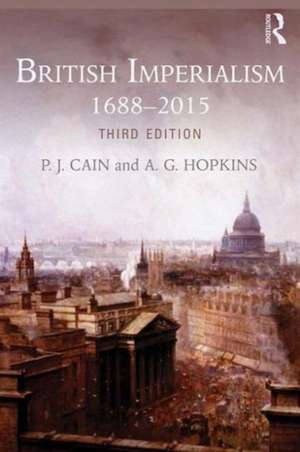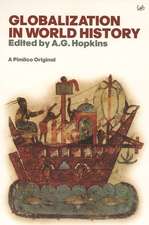British Imperialism: 1688-2015
Autor P. J. Cain, A. G. Hopkinsen Limba Engleză Paperback – 11 mar 2016
Containing a significantly expanded and updated Foreword and Afterword, this third edition assesses the development of the debate since the book’s original publication, discusses the imperial era in the context of the controversy over globalization, and shows how the study of the age of empires remains relevant to understanding the post-colonial world. Covering the full extent of the British empire from China to South America and taking a broad chronological view from the seventeenth century to post-imperial Britain today, British Imperialism: 1688–2015 is the perfect read for all students of imperial and global history.
Preț: 397.94 lei
Preț vechi: 432.55 lei
-8% Nou
Puncte Express: 597
Preț estimativ în valută:
76.18€ • 78.35$ • 63.20£
76.18€ • 78.35$ • 63.20£
Carte disponibilă
Livrare economică 28 ianuarie-11 februarie
Livrare express 14-18 ianuarie pentru 57.95 lei
Preluare comenzi: 021 569.72.76
Specificații
ISBN-13: 9781138817739
ISBN-10: 1138817732
Pagini: 794
Ilustrații: 40 black & white tables, 12 black & white line drawings
Dimensiuni: 156 x 234 x 43 mm
Greutate: 1.22 kg
Ediția:Revised
Editura: Taylor & Francis
Colecția Routledge
Locul publicării:Oxford, United Kingdom
ISBN-10: 1138817732
Pagini: 794
Ilustrații: 40 black & white tables, 12 black & white line drawings
Dimensiuni: 156 x 234 x 43 mm
Greutate: 1.22 kg
Ediția:Revised
Editura: Taylor & Francis
Colecția Routledge
Locul publicării:Oxford, United Kingdom
Public țintă
General and UndergraduateCuprins
Foreword: The Continuing Debate on Empire. Part 1. 1. Introduction: 1688-1914. 1. The Problem and Context 2. Prospective: Aristocracy, Finance and Empire, 1688-1850 Part 2. The Gentlemanly Order: 1850-1914.. 3. ‘Something Peculiar to England’: The Service Sector, Wealth and Power, 1850-1914 4. Gentlmanly Capitalism and Economic Policy: City, Government and the ‘National Interest’, 1850-1914 5. ‘The Great Emporium’: Foreign Trade and Invisible Earnings, 1850-1914 6. Two Nations? Foreign Investment and the Domestic Economy. 1850-1914 7. Challenging Cosmopolitanism: The Tariff Problem and Imperial Unity, 1880-1914 Part 3. The Wider World: 1850-1914. 8. ‘An Extension of the Old Society’: Britain and the Colonies of Settlement, 1850-1914 9. Calling the New World into Existence: South America, 1815-1914 10. ‘Meeting her Obligations to her English Creditors’: India, 1858-1914 11. ‘The Imperious and Irresistable Necessity’: Britain and the Partition of Africa, 1882-1902 12. ‘We Offer Ourselves as Supporters’: The Ottoman Empire and Persia, 1838-1914 13. ‘Maintaining the Credit-Worthiness of the Chinese Governmant’: China, 1839-1911 Part 4. Redividing the World. 14. Britain, Germany and ‘Imperialist’ War, 1900-1914 15. Retrospect: 1688-1914 Part 5. The Empire in the Twentieth Century 16. The Imperialist Dynamic: From World War I to Decolonisation Part 6. The Gentlemanly Order, 1914-39. 17. ‘The Power of Constant Renewal’: Services, Finance and the Gentlemanly Elite, 1914-39 18. Industry, the City and the Decline of the International Economy, 1914-39 19. Upholding Gentlemanly Values: The American Challenge, 1914-31 20. ‘A Latter-Day Expression of Finanial Imperialism’: TheOrigins of the Sterling Area, 1931-39 Part 7. The Wider World, 1914-49 21. Maintaining Financial Discipline: The Dominions, 1914-39 22. ‘A New Era of Colonial Ambitions’: South America, 1914-39 23. ‘Financial Stability and Good Government’: India, 1914-47 24. ‘Playing the Game’ in Tropical Africa, 1914-40 25. ‘The only Great Undeveloped Market in the World’: China, 1911-49 Part 8. Losing an Empire and Finding a Role, 1939-2000 26. The City, the Sterling Area and Decolonisation 27. Conclusion: 1688-2000 Afterword:Empires and Globalization. Maps. Further Reading. Index.
Notă biografică
P.J. Cain is Emeritus Research Professor of History, Sheffield Hallam University.
A.G. Hopkins is Emeritus Smuts Professor of Commonwealth History, University of Cambridge and an Emeritus Fellow of Pembroke College.
A.G. Hopkins is Emeritus Smuts Professor of Commonwealth History, University of Cambridge and an Emeritus Fellow of Pembroke College.
Recenzii
"Cain and Hopkins’ British Imperialism reinvigorated the debate about the ‘Expansion of England’ over twenty years ago, and today its argument is as ambitious, intriguing, and provocative as ever. A triumph of scholarly synthesis that spans centuries and continents, it remains one of the truly indispensable texts for understanding the origins of empire."
Allan Allport, Syracuse University, USA
"British Imperialism still stands as expansive imperial history at its best: simultaneously methodical yet bold, detailed yet clear, its main arguments sparkle with a subversive revisionism that makes it fully deserving of its continuing position as essential reading on Britain’s global relationships in the modern age."
Christopher Prior, University of Southampton, UK
"The work of Cain and Hopkins is essential for understanding the scope and strength of the British Empire. While no one frame of analysis is sufficient to encompass the full complexity of the British Empire, finance capital was critical to its influence, expansion, and power relative to other contemporary states and empires. No work explains the scope of British financial power or its role in determining global relationships in the modern period better than British Imperialism."
Charles Upchurch, Florida State University, USA
"Cain and Hopkins’ British Imperialism reinvigorated the debate about the ‘Expansion of England’ over twenty years ago, and today its argument is as ambitious, intriguing, and provocative as ever. A triumph of scholarly synthesis that spans centuries and continents, it remains one of the truly indispensable texts for understanding the origins of empire."
Allan Allport, Syracuse University, USA
"British Imperialism still stands as expansive imperial history at its best: simultaneously methodical yet bold, detailed yet clear, its main arguments sparkle with a subversive revisionism that makes it fully deserving of its continuing position as essential reading on Britain’s global relationships in the modern age."
Christopher Prior, University of Southampton, UK
"The work of Cain and Hopkins is essential for understanding the scope and strength of the British Empire. While no one frame of analysis is sufficient to encompass the full complexity of the British Empire, finance capital was critical to its influence, expansion, and power relative to other contemporary states and empires. No work explains the scope of British financial power or its role in determining global relationships in the modern period better than British Imperialism."
Charles Upchurch, Florida State University, USA
Praise for previous editions:
"A magisterial account of 300 years of British history, properly putting the empire right at the centre."
Will Hutton, The Guardian
"A stunning mixture of narrative, analysis and brillian historiographical deconstruction."
Denis MacShane, New Statesman
"As erudite as it is stimulating."
Le Monde Diplomatique
"Essential reading for anyone working in the City."
Sunday Telegraph
Allan Allport, Syracuse University, USA
"British Imperialism still stands as expansive imperial history at its best: simultaneously methodical yet bold, detailed yet clear, its main arguments sparkle with a subversive revisionism that makes it fully deserving of its continuing position as essential reading on Britain’s global relationships in the modern age."
Christopher Prior, University of Southampton, UK
"The work of Cain and Hopkins is essential for understanding the scope and strength of the British Empire. While no one frame of analysis is sufficient to encompass the full complexity of the British Empire, finance capital was critical to its influence, expansion, and power relative to other contemporary states and empires. No work explains the scope of British financial power or its role in determining global relationships in the modern period better than British Imperialism."
Charles Upchurch, Florida State University, USA
"Cain and Hopkins’ British Imperialism reinvigorated the debate about the ‘Expansion of England’ over twenty years ago, and today its argument is as ambitious, intriguing, and provocative as ever. A triumph of scholarly synthesis that spans centuries and continents, it remains one of the truly indispensable texts for understanding the origins of empire."
Allan Allport, Syracuse University, USA
"British Imperialism still stands as expansive imperial history at its best: simultaneously methodical yet bold, detailed yet clear, its main arguments sparkle with a subversive revisionism that makes it fully deserving of its continuing position as essential reading on Britain’s global relationships in the modern age."
Christopher Prior, University of Southampton, UK
"The work of Cain and Hopkins is essential for understanding the scope and strength of the British Empire. While no one frame of analysis is sufficient to encompass the full complexity of the British Empire, finance capital was critical to its influence, expansion, and power relative to other contemporary states and empires. No work explains the scope of British financial power or its role in determining global relationships in the modern period better than British Imperialism."
Charles Upchurch, Florida State University, USA
Praise for previous editions:
"A magisterial account of 300 years of British history, properly putting the empire right at the centre."
Will Hutton, The Guardian
"A stunning mixture of narrative, analysis and brillian historiographical deconstruction."
Denis MacShane, New Statesman
"As erudite as it is stimulating."
Le Monde Diplomatique
"Essential reading for anyone working in the City."
Sunday Telegraph
Descriere
A milestone in the understanding of British history and imperialism, this ground-breaking book radically reinterprets the course of modern economic development and the causes of overseas expansion during the past three centuries. Employing their concept of 'gentlemanly capitalism', the authors draw imperial and domestic British history together to show how the shape of the nation and its economy depended on international and imperial ties, and how these ties were undone to produce the post colonial world of today. Containing a new Foreword and Afterword and updated to include new directions in the field, as well now coming up to the present day financial crisis, this third edition of British Imperialism is the perfect read for all students of Imperial and global history.













